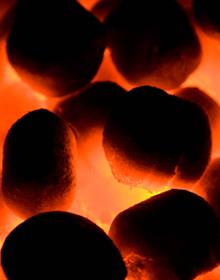19 December 2019
By Elaine Murphy
elaine@TheCork.ie
The Minister for Communications, Climate Action and Environment Richard Bruton T.D. yesterday announced that the smoky coal ban will be extended to all towns with populations over 10,000 people. The Minister has also said that the government would not be proceeding with a nationwide ban on smoky coal, on the basis that such a ban carries a serious risk of illegality, unless peat, turf and wet wood were also included.
From September 2020, smoky coal will be banned in thirteen additional towns, meaning smoky coal will be banned in all towns in the country with populations over 10,000 people:
| County | Town |
| County Cavan | Cavan Town |
| Cork | Cobh, Midleton and Mallow |
| Kerry | Killarney |
| Longford | Longford Town |
| Mayo | Castlebar
Ballina |
| Meath | Ashbourne
Laytown-Bettystown |
| Offaly | Tullamore |
| Waterford | Tramore |
| Wexford | Enniscorthy |
Here in Cork, Cork County Council will be primarily responsible for the enforcement of the ban in Cobh, Midleton and Mallow through inspections of premises and vehicles used for the sale and distribution of solid fuel. The Council may issue fines of up to €1,000 for alleged offences relating to the marketing, sale and distribution of prohibited fuels or bring prosecutions under the Air Pollution Act 1987 for breaches of the regulations.
Recent air quality monitoring in three of these towns (Cobh, Enniscorthy and Longford) has shown that although air quality has met EU requirements, the results have been in exceedance of the stricter WHO air quality standard limits. On this basis, it has been decided that all built-up areas in the country should benefit from a ban.
It has been announced by the new EU Commission president that the proposals to revise air quality standards to align them more closely with the World Health Organization recommendations will be brought forward.
The Minister continued:
Many of the Actions we are taking in the Climate Action Plan, such as our plan for a new National Programme for Housing upgrades, will reduce the reliance people have on solid fuels. We will ensure that 500,000 homes are upgraded in the coming decade, with 600,000 renewable heating systems / heat pumps installed.
Nationwide Smoky Coal Ban
The Minister confirmed that a nationwide ban on smoky coal carries a serious risk of illegality, unless peat, wet wood and turf were also addressed.
The Minister said:
I am not proceeding with a nationwide ban at this time as such a ban carries a serious risk of illegality unless turf, peat and wet wood are also addressed. We will proceed in a gradual and proportionate way and extend the current smoky coal ban to 13 new towns where there are particular air quality issues and to address immediate health concerns in these towns. This will come into effect from next September and will lead to immediate improvements in air quality.
To proceed with a nationwide ban regardless of circumstance would expose people in rural areas, who have traditional sources of logs and turf which they rely upon, to the risk of a sudden ban. I am not willing to do this. To pretend that a nationwide ban does not carry this probable outcome is to be dishonest.
I am preparing the first ever Clean Air Strategy, and will come back to government in the New Year with further proposals to improve air quality.
Enforcement of the Existing Ban
The Minister also announced that work is underway to strengthen enforcement of the current smoky coal ban. Options which are being considered include:
- The development of a regional approach to air quality and noise enforcement, in line with other areas of environmental enforcement such as waste, which has proven to be very successful;
- A multi-agency approach to enforcement would have greater impact on issues including the sale of high-sulphur content fuel imported from the UK and the Department is currently actively engaging with Local Authorities and the Revenue Commissioners in that context at present.
Improving Air Quality Monitoring
The government will invest €5m to improve our network of air monitoring stations in the next five years. This is vital to establishing hard, scientific evidence of the standard of air in different parts of the country. This €5m investment will:
- Develop a greatly expanded national monitoring network
- Enhance the provision of real-time, localised air quality information to local authorities and to the public
- Assist Local Authorities in terms of enforcement within their areas, as well as providing a more accurate nationwide air quality picture for policy makers.
Air quality monitoring has advanced significantly in recent times. Air quality in Ireland is monitored by the EPA by way of a network of 31 monitoring stations, which will soon double as government double the funding being provided. Furthermore, better modelling and research mean we have a much better understanding of particulate matter than when the ban was first introduced in 1990.

